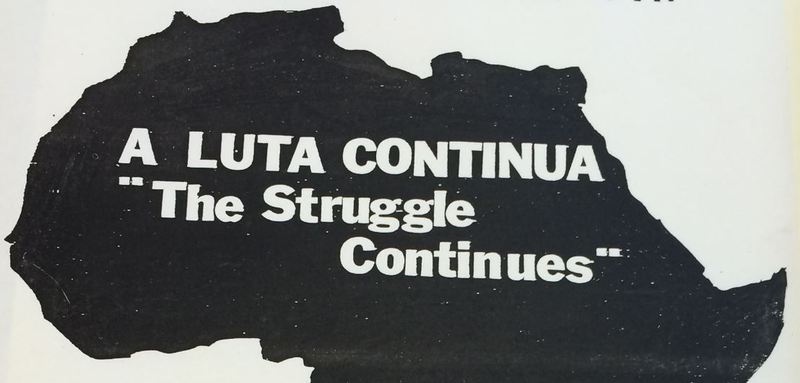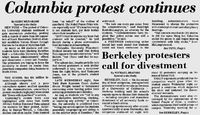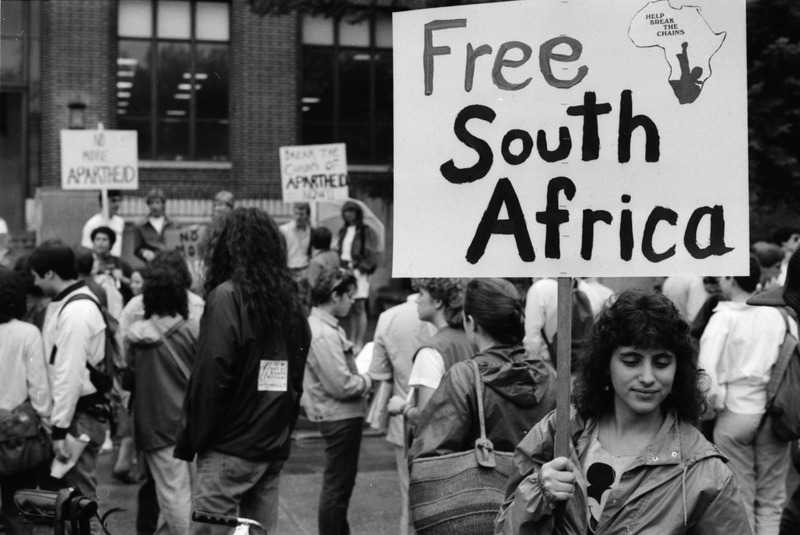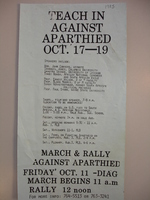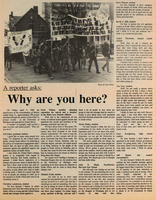National Weeks of Action
After the Regents’ decision to divest 90 percent of the University’s investments in companies operating in South Africa, large anti-apartheid protests disappeared from campus. Instead, student activists worked on smaller, quieter projects. They lobbied elected officials, held educational events, and sold bracelets for solidarity with South African political prisoners. This period of calm abruptly ended in April of 1985. That spring, large divestment protests erupted at Columbia University and the University of California – Berkley. As the protests grew, they started drawing national press coverage. The Michigan Daily covered the story on its front page throughout that April. At campuses around the country, protests in solidarity with the students of Columbia and Berkley began to appear.
The U.S.'s oldest anti-aprtheid organiztion, the American Committee on Africa, was a significant contributer to these spreading protests. As this WCCAA newsletter from January 1985 shows, the ACOA had planned Coordinated Weeks of National Anti-Apartheid Action to happen from March 21 to April 6, 1985. The protests at Columbia and UC-Berkley coincided with these "National Weeks." The involvement of national groups, like the ACOA, helps explain how the protests were able to rapidly spread to campuses across the nation.
Eventually, this spreading wave of activist spirit reached U of M. The Michigan Student Assembly passed a resolution in support of the protesters and it was read to the students at a rally on Berkley’s campus. Barbara Ransby, a UM history graduate student and former undergraduate chair of Columbia University’s Coalition for a Free South Africa, organized speeches, petitions, and educational events. On April 20th, more than 70 protesters gathered on Elbel Field on U of M’s campus to protest apartheid and other issues, like U.S. intervention in Central America. Four days later, on April 24th, 400 students gathered on the Diag to protest apartheid and called on the University to divest its remaining $5 million of stock in companies doing business in South Africa. The national protests had reignited the local debate. Following the rally, a group of student activists began camping in front of the Graduate Library. They explained the divestment issue to people walking through the Diag and gathered signatures for a petition calling for full U of M divestment.
The spring of 1985 also saw the creation of a new student group, the Free South Africa Coordinating Committee (FSACC). They described themselves as “a multi-racial and multi-ethnic campus-based group of faculty and students committed to opposing the brutal system of Apartheid in South Africa.” The FSACC was an umbrella organization that helped bring together Black student groups, anti-racism groups, and other anti-apartheid and African liberation groups together in coordinated anti-apartheid activities. In addition to protesting apartheid and calling on U of M to fully divest, the FSACC also called on the University to grant an honorary degree to Nelson Mandela, worked to combat racism in the U.S., and criticized policies of the Regan administration. Quickly, the FSACC became a leading group in UM’s anti-apartheid movement.
Further Divestment, Continued Protest
Neither the summer vacation, nor the Regents’ decision to appeal the August 1985 Circuit Court ruling, which ruled in favor of the constitutionality of P.A. 512, could slow the momentum of the campus anti-apartheid movement. On the last page of their September/October 1985 newsletter, the WCCAA explained the court case and organized a protest of the Regents meeting "to tell the Regents that it is time they stopped fighting P.A. 512 and complied with it." The day after the Regents announced their appeal, about 50 students gathered on the steps of the Graduate Library to commemorate the eighth anniversary of Steve Biko’s death. Pressure from student activists and the authority of state policy gained a minor victory in September of 1985, when the Regents voted to divest an additional $4.5 million, leaving it with only $500,000 in South African stock. However, anti-apartheid supporters would not accept anything less than full divestment.
Barbara Ransby, now the head of the FSACC, said that “the Regents tried to find a compromise, a middle ground between divestment and apartheid. We say it has to be unequivocal.” That fall, Michigan students coordinated with protesters across the country in the National Days of Action on Apartheid. On October 11th, 1985, 200 Michigan students held a rally on the Diag, while similar events were held at more than 100 campuses in the U.S. The protesters were becoming a problem for the administration. This August, 1985 memo to UM President Harold Shapiro reveals that NBC's Today Show was scheduled to be on campus on the same day as these national protests. The memo says, "It does seem that having national news media here for our local 'protest' presents us with a unique challenge, which, if carefully orchestrated, could work to our advantage. It could also be an unmitigated disaster." The problem did not go away quickly. Coordinated national protests, like these National Days of Action, sponsored by national anti-apartheid organizations like the American Committee on Africa, would become a feature of the movement throughout the rest of the 1980s.
The activist energy from 1985 continued into the next year, as college students around the country commemorated the Sharpeville Massacre of 1960 with the National Weeks of Anti-Apartheid Action from March 21 to April 6, 1986. At the University of Michigan, students in the FSACC rallied outside a Regents meeting before building a shanty on the Diag. The students occupied the shanty for 24 hours a day until April 6, the end of the weeks of action, despite some attacks to the shanty on April 4, 1986. At the University of California-Berkeley, a shantytown was destroyed in a protest on the same day. In addition to the shanty, the National Weeks activities at UM also included films, guest speakers, a candlelight vigil, and a march through the streets of Ann Arbor that 500 people joined. Randall Robinson, a founder of TransAfrica and a leader in the U.S. movement against apartheid, not only supported and encouraged the continued protest of the college students, but also the granting of an honorary degree to Nelson Mandela, which was a contentious and widespread effort on campus at the time. By this point, the University had divested all but one percent of its holdings in companies that did business in South Africa. However, the University continued to contribute millions of dollars in pension funds, which held $6 billion in South Africa-related investments.
Later in the same year, National Protest Days for South African Divestment and Sanctions were held on October 10 and 11, 1986, when over 50 college campuses around the United States participated to express their disapproval of the continued financial ties between U.S. corporations and South Africa. The first day of the National Protest Days coincided with South Africa Political Prisoner Day. Michigan students began an “Adopt a Political Prisoner of Apartheid Project,” with the ultimate goal of having the University adopt two political prisoners as part of a larger goal of pressuring the South African government. The stated goal of the Project was to “incorporate the University of Michigan into this important human rights movement.” Sustained support from national organizations like the ACOA was clearly instrumental in organizing these campaigns of the mid-1980s, providing campus activists with campaign materials such as the "Resource Packet" shown here.
That same October, Perry Bullard brought up the rivalry between the University of Michigan and Michigan State University to discuss apartheid. According to a Michigan Daily Article, he mentioned that Michigan State was among the first major universities to fully divest, further emphasizing the University of Michigan Regents’ “shameful position."
Sources for this page:
The Ann Arbor News, April 30, 1985
The Michigan Daily, April 12, 1985
The Michigan Daily, April 14, 1985
The Michigan Daily, April 18, 1985
The Michigan Daily, April 20, 1985
The Michigan Daily, April 21, 1985
The Michigan Daily, April 23, 1985
The Michigan Daily, September 13, 1985
The Michigan Daily, September 23, 1985
The Michigan Daily, October 14, 1985
The Michigan Daily, March 21, 1986
The Michigan Daily, March 24, 1986
The Michigan Daily, October 13, 1986
The Michigan Daily, October 31, 1986
Free South Africa Coordinating Committee, "Free South Africa Coordinating Committee is:," n.d. [1986], Colonialism and Imperialism-Africa-South Africa-Free South Africa Coordinating Committee Subject Vertical File, Joseph A. Labadie Collection, Special Collections Library, University of Michigan.
No author, "National Weeks of Action Against Racism and Apartheid," March 20, 1986, Vertical File: Activism 1980s, Bentley Historical Library, University of Michigan.

